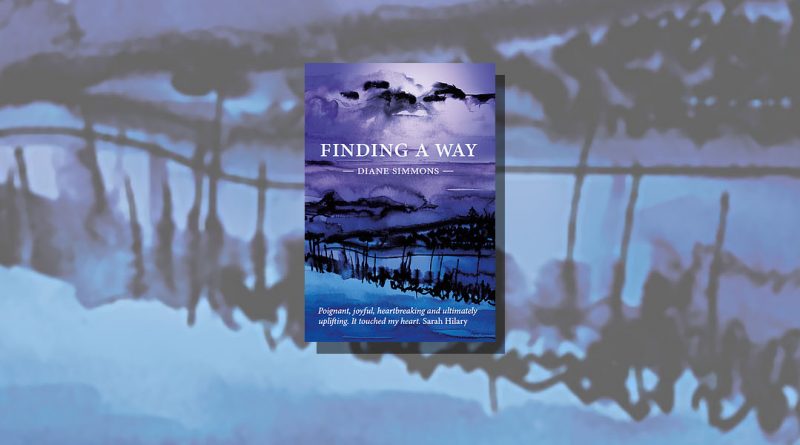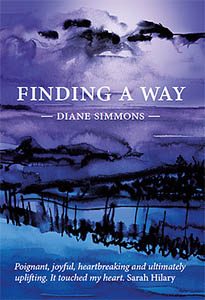Finding a Way by Diane Simmons
– Reviewed by Cath Barton –
From Liz sorting through jewellery intended for her daughter Becky to inherit, to the family presenting an award in her name at her old school, this collection of flash fiction charts the family’s grief over the three years since twenty-one-year-old Becky’s death from stomach cancer.
Flash fiction lends itself well to showing the many facets of the prism of grief, here principally through the eyes of Becky’s mother, father, brother and husband, and Diane Simmons shows herself adept in use of the form. She conveys succinctly and without becoming mawkish, the range of emotions which people who are bereaved experience.
Although they are arranged in chronological order, the stories demonstrate starkly that grief does not follow a linear progression, and certainly not a diminution over time, although life continues and expands around it.
There is a strong sense sewn through these stories of the desire of those bereaved to hear again from their loved one who has died. The title of the collection, Finding a Way, does not refer to those who live on but to the one who has died. In the title story Christopher, Becky’s father, is still hoping for a card from his daughter two weeks after his birthday. It concludes:
“It is over three years since Becky died – his fourth birthday of checking the post every day, of scanning the cards for her name – his fourth birthday of hoping that somehow, she’ll have found a way to reach him.”
Similarly, Liz holds on to the impossible possibility – by not opening the card that comes with a bunch of white roses she receives on Mother’s Day, she can believe they could be from her daughter. And no matter how many times Sam, Becky’s brother, returns to the park where the family scattered her ashes, “Becky is never there.”
The fifty one flashes in this collection illuminate the nature of grief with a degree of compassion which is surely informed by Simmons’ personal experience, the book being dedicated to the memory of her own daughter.
Memoir and fiction can run in close furrows, but the former is one person’s story and this collection is – and cleverly so – several interlocking but separate perspectives, although perhaps most strongly through the stories told by Liz, the mother.
Anger and upset erupt for different members of the family in different settings – for Sam, Becky’s brother, in the shower where he can cry unheard, for Liz when a friend has painted a picture of Becky from a photograph taken after she’d become ill. There is anger too about the language people use about death such as ‘passing’, and false assumptions about the passage of time and ‘forgetting’.
With a light but steady touch Simmons covers much ground, including the physical effects of grief, and her stories are firmly set in the present day with references to Facebook friend classifications and Jake, Becky’s husband, obsessively scrolling through her past text messages. Liz searches online for an old school friend:
“Facebook’s clever at re-connecting friends. But it’s not that clever – it hasn’t found a way to get in touch with the dead. Not yet.”
In a subsequent story we learn that Amy, the school friend, died herself at almost the same age as Becky. It’s one of many poignant touches.
Some of the stories are told in the third person, others in the first person, but any potential confusion is minimised by the signposting of whose story is being told at the beginning of each flash.
In the centre of the stories is the absent Becky, but if she does not come alive for us, the readers, she clearly lives on in the memories of those who loved her. This collection shows that a strong structure can be built from the bricks of flash fiction, given a writer such as Simmons who can employ both skill and care.
Find out more about Finding a Way on the Ad Hoc Fiction website.

Reviewed by Cath Barton — Cath Barton’s prize-winning novella The Plankton Collector (2018) is published by New Welsh Rarebyte and her second novella, In the Sweep of the Bay (2020), by Louise Walter Books. Cath is also active in the on-line flash fiction community.
Photo © Toril Brancher
Twitter: @CathBarton1 | Website: cathbarton.com






